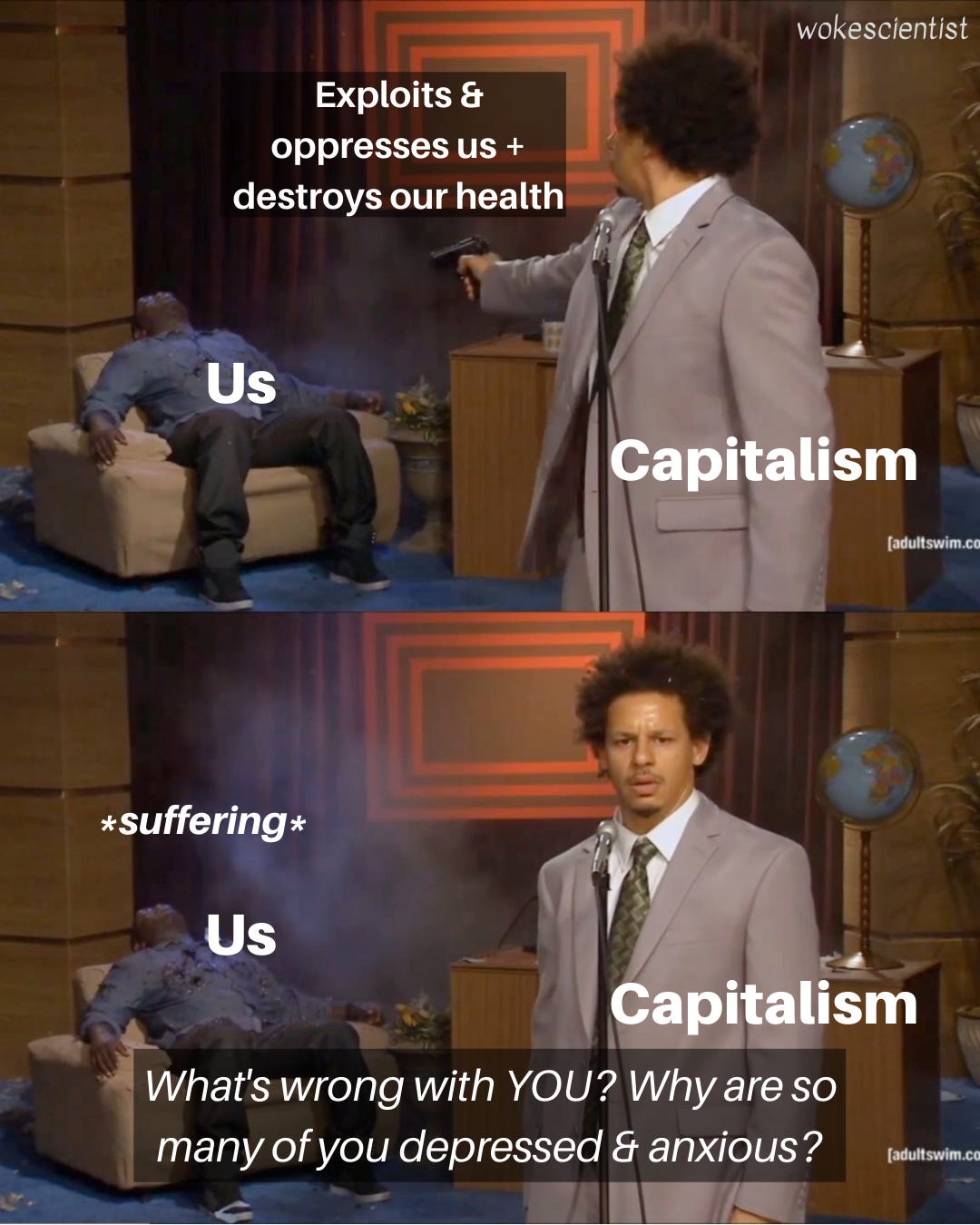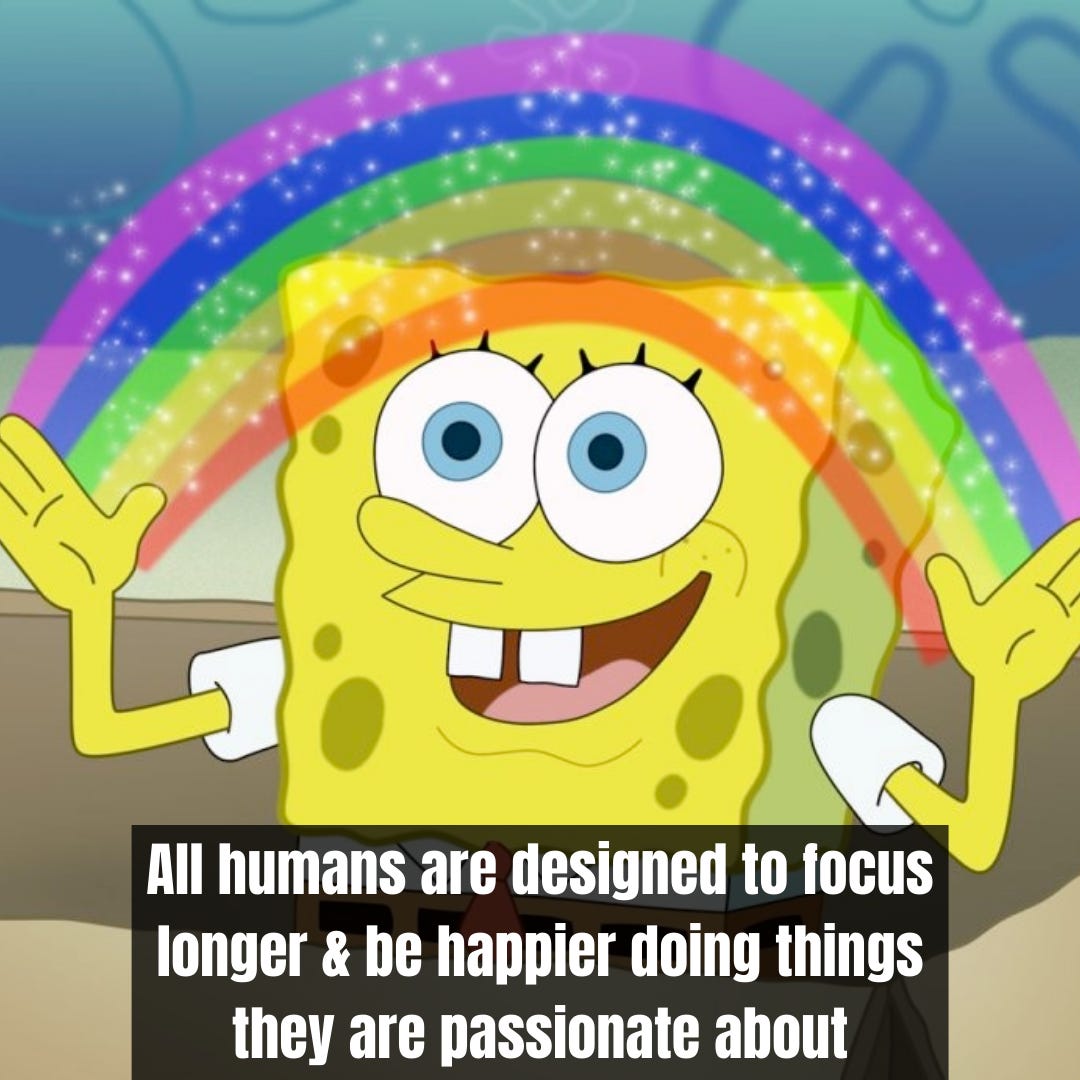We're all capable of divergence
What if we drop the (neuro) in neurodivergence & skip the bioessentialism?
When I was young, I was punished for my divergence, deviance & defiance- from school to my abusive household. I was ostracized & forced to conform not only because I was “too much”, too hyperactive, too unfocused, too emotional, too disobedient, too talkative, or too “odd”; I was also too “foreign”, too brown, too dark, too poor, too Muslim, too Hindu, too boyish, too *insert divergent trait here*.
We do not exist in a vacuum- every trait, behavior, our personality, identity & how we perceive the world/ ourselves is defined by the social context we exist in (i.e. this capitalist colonial society with all its enforced power structures, social norms, & binaries of good/ bad or normal/abnormal). None of us are “born this way” so to say. We are shaped & molded by society. Capitalism decides who is disabled or not.
TABLE OF CONTENTS
The red pill is difficult but liberating and the blue pill is a trap
The two ways capitalism fucks up our brain — pathologizing divergence & creating trauma responses
Reframing symptoms & divergent traits — from ADHD, autistim, OCD, C-PTSD, depression, & anxiety, to psychosis
We’re all capable of & need divergence — on political rebellion & deviance
Side note: guess what? You can now sign up for my interactive workshop!
1. I get it, the “red pill” is not easy to take
Many interpret the word “neurodivergent” as “different brain” or “atypical brain” and believe in the existence of “typical brains” or “normal people” without questioning who sets the standard for what is “normal” or “typical”.
I held these false beliefs early on when I struggled to identify the root of the crushing pain, mental anguish, loneliness, & unworthiness I felt my whole life. It helped me direct my resentment at other people who superficially seemed like they “fit in” better. Even though I was just trying to survive- my reductive self-centered “us versus them” reactionary thinking was a trap designed for me by capitalism itself. It was easier for me to grasp that I or other people were “broken” rather than society itself.
When we suffer- it is harder to comprehend that we live in a fundamentally brutal world where our safety, survival and security is never guaranteed and easier to individualize our problems or blame ourselves or others.
It is difficult for us to understand that we were forced into a planet where we have to “earn” the right to live. Also when others hurt us- it is difficult to see that our communities are traumatized from generations of colonialism & capitalist oppression that trickles down & manifests as abuse. So to survive- we convince ourselves that there is something innately flawed or wrong with us or others. We resort to binaries of “good/ evil” because it is easier- AT FIRST. But overall, it’s a trap that keeps us stuck.
2. The two ways capitalism fuck us up
Yes- biodiversity exists and certain traits are framed as “abnormal” and people are disabled accordingly but also our biology is shaped by our environment. Capitalism causes chronic illnesses, shortens our life spans, brutalizes us & frames our response to these stressors as “disorders”. At baseline, our traits exist as neutral— their positive or negative manifestations (as we experience them internally or as they are perceived by others) is all contextual based on our social environment.
Capitalism actively inflicts & creates widespread suffering. It makes us all sick to varying degrees. It also creates negative manifestations of traits that exist as neutral & dims or erases positive manifestations because our authenticity is punished & we are brainwashed over a lifetime to conform. We are not allowed to exist freely.
3. Reframing symptoms/ divergent traits
Let’s examine some traits that are framed as “symptoms” under psychiatric diagnoses. They give us a clue into how all humans can thrive- if allowed
“Attention Deficit” (ADHD, OCD), also framed as “interest based nervous systems” or “hyperfocus”
This is a “symptom” that even in mainstream mental health culture is labeled as a unique trait in people who are “built different” when in reality no one is built to sit in a cubicle 40-100 hours a week at a mundane job where our bodies & minds are exploited for labor to serve the rich. Our attention spans are also being reduced in the age of fast information like 140 character tweets, nonstop stimuli consumption on IG, 1 minute Tiktoks or reels, etc. We’re being primed to seek instant gratification & consume content fast to distract ourselves from the pain of existence.
Sitting in classrooms for hours, competing against our peers, forced to learn useless info, standardized testing & coerced to study according to arbitrary rules to “succeed” isn’t “healthy” for anyone. Many don’t have a choice & many struggle to conform — how this looks on the outside is variable. Some can’t afford to rebel because the stakes are too high.
Without capitalist workplaces or educational systems, with more cooperation & collaboration in a world where we have more agency, free will & time to pursue our interests from a variety of options without fearing death (which is the punishment for not conforming today) because our basic survival needs are always guaranteed- we’d focus longer on things we care about. Also yes- people tend to “hyperfocus” on things they are genuinely interested in.
“Disassociation” (C-PTSD, Psychosis, OCD, BPD, etc) also framed as “maladaptive daydreaming”
Disassociating from our painful reality is a survival mechanism- it occurs in specific contexts, is neutral at baseline & not a “deficit” we are born with. Over time, it also forces us to construct vivid alternative realities & worlds using our imagination which ignites hope in us to persevere thru our suffering. Normalized disassociation looks like doomscrolling on social media to disassociate from painful emotions or difficult thoughts. Psychiatry pathologizes disassociation as a symptom on the spectrum of psychosis but ignores the social context in which people are forced to disassociate & that creativity requires a certain level of disassociation or “bold imagination”.
Studies show that disassociation is associated with higher creativity, originality, & innovative nonlinear thinking. In fact, creativity requires flexibility, divergent thinking, novelty seeking behavior (which is pathologized in ADHD as “dopamine addiction”) & suppression of latent inhibition. Art students with higher disassociation scores also score higher on creative imagination. I needed to see that my “maladaptive daydreaming” is not just a neurological disorder, it emerged in context of a traumatic society, has positive manifestations and the negative manifestations are exacerbated due to capitalism’s stressors & the community it deprives us of.
“Executive dysfunction” (Autism, ADHD, OCD, C-PTSD) also framed as “poor working memory” “disorganized”
It’s in the name- the gold standard for being “normal” here is being like a capitalist executive thriving. This “symptom” exists entirely in the context of capitalism where we’re considered “good workers” if we work long hours, maximize productivity, cross monotonous tasks off a checklist, & stay “organized” so we can prioritize work. No one brain naturally thrives on girl boss culture- we’re forced to conform since birth.
Humans aren’t built to DO as much as we’re forced to do under capitalism without free will & rest. Somethings gotta give. Capitalism sucks up our energy & leaves us depleted which is how its designed to function- so we don’t question our state & rebel. To succeed under capitalism, you need to follow rules & have a good “working memory”. If you want to be creative- by default, you’ll struggle to fall in line under capitalism & memory is the price to pay. As Jess discusses here in Sluggish-
“A 2021 study in Cognition found divergent thinking (that non-linear, expansive kind which generates novel ideas; “thinking outside the box”) was linked with memory errors — creative people misremembered things more. A similar study in 2014 concluded that “forgetting may contribute to the ability to think creatively.” Memory researcher Daniel Schacter has argued that these “sins” of memory are the necessary cost of flexibility and problem-solving.
You can’t remember too precisely, because then you can’t generalize your memories to solve problems in the present. And you can’t remember too much, because your brain would struggle with information management.
If you have to forget some things in order to come up with new ideas, then it makes sense that the more ideas you have, the more forgetful you’ll be.”
“Rejection sensitivity dysphoria” (ADHD, Autism) also framed as “emotional dysregulation” (more so in the context of C-PTSD)
When we experience a lifetime of trauma, oppression & rejection under capitalism which makes us feel deficient & unworthy- in certain contexts, being exposed to more stressors can be emotionally overwhelming. This is human & it happens to all of us in the right social context. The complexity of how we process emotions when interfacing with a world defined by colonialism & capitalism cannot be reduced to a biological deficit or disorder we were “born with”. If you grew up with emotionally immature parents (who are that way because of their own oppression & past trauma), you don’t innately know how to process complex emotions & rely on others to co-regulate. Emotional regulation skills are taught by caregivers, community members & we develop them as we practice being in reciprocal relationships with people where we feel safe to navigate conflict & accountability with compassion.
Depression, anxiety & the chemical imbalance myth
It’s interesting that depression & anxiety are “symptoms” or classified as comorbidities under all psychiatric diagnoses. I’ve written before about how mental illness, specifically- chronic depression & generalized anxiety has skyrocketed under capitalism because it is slowly killing us. Our distress cannot be reduced to a deficit or imbalance in neurotransmitters- though pharma companies want you to believe that so you take meds that claim to compensate.
4. Reimagining divergence as critical for our survival as a species & for our planet
As I have access to more privilege, more safety or security- my “neurodivergence” manifests openly & I’m more self-aware of how I don’t want to conform. Before- I was very “neurotypical” on the surface (i.e. masking) because as a kid from the Global South, the world wasn’t my oyster & I had no agency. Today- I have a tad bit more agency to be able to pushback on capitalist norms. This tells us that with more freedom & agency- we’re all capable of diverging & have to if we’re going to change the systems that are killing us. Our pain is contextual, our divergence is contextual & the context is capitalism/ colonialism. Together, we can change this context to truly give people a real shot at being who they are- complex, diverse, heterogenous, nonbinary & capable of infinite possibilities…








